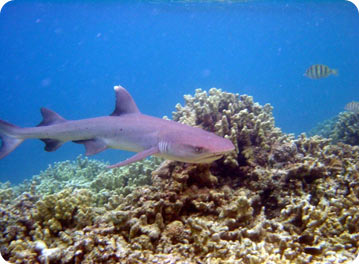For a shark, retirement paradise isn’t Florida. Instead, it just may be one of two small island-nations that recently banned shark fishing from their territorial waters.
 Sharks now have a safe haven in the waters off two small island-nations. Credit: National Oceanic & Atmospheric Administration
Sharks now have a safe haven in the waters off two small island-nations. Credit: National Oceanic & Atmospheric AdministrationAnd sharks can use the protection. Although they have a reputation as vicious man-eaters, they’re much more likely to be eaten by people than the other way around. Shark meat and shark-fin soup are increasingly popular around the world, so the number of sharks harvested by commercial fishing operations has skyrocketed. The United Nations estimates that fishing vessels reel in more than 900,000 tons of shark a year. And one in six species of shark is listed as endangered or threatened.
But in some countries, sharks may be worth more alive than dead because they help attract divers and other tourists. An example is Palau, which is a few hundred miles east of the Philippines. Late last year, Palau’s president told the U.N. that his country was banning commercial fishing of sharks and rays.
Palau’s total land area is about the same as the city of Albuquerque. But the country consists of about 200 islands that stretch across hundreds of miles. That gives it control of almost a quarter-million square miles of Pacific Ocean -- an area as big as Texas.
Early this year, the Maldives followed Palau’s lead. That country consists of a chain of islands in the Indian Ocean, off the tip of India. Its territorial waters are much less extensive than Palau’s, but they’ll still provide haven for lots of sharks -- retired or not.

